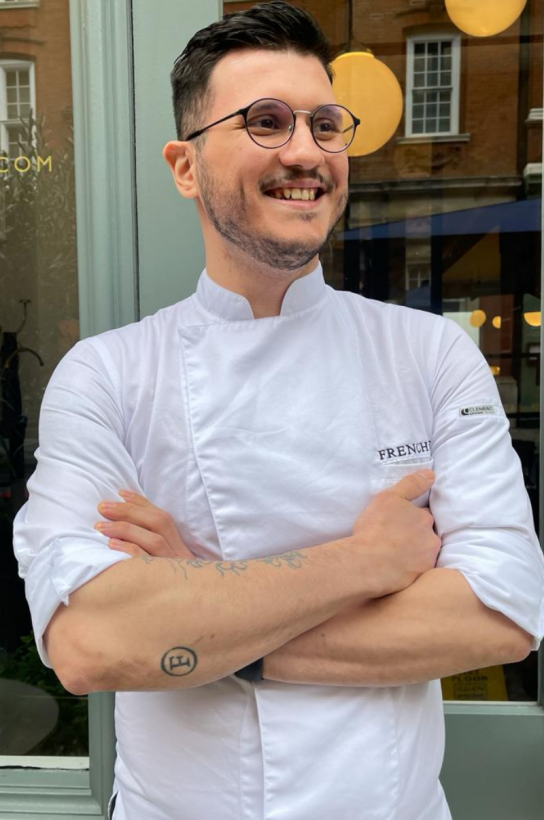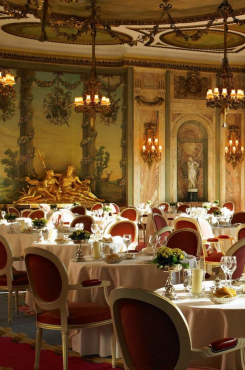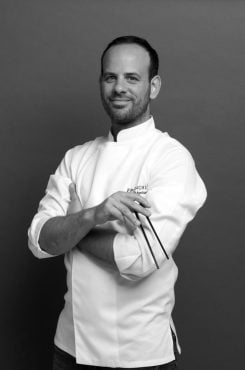CODE meets Ivan Vukadinovic, Frenchie
Published 10 September 2021
by Céire Carey

Ivan Vukadinovic was appointed Frenchie’s head chef in August after returning to the restaurant this year. Hired back first as a sous chef, he emerged as the winning candidate in the long process of finding a head chef.
Part of Gregory Marchand’s Frenchie collection, which opened its first site in 2009 in Paris’ Rue du Nil, the London outpost resides in bustling Covent Garden. Since the very beginning, it has been serving up modern French food with a flair for dramatics. Every plate is a construction of beauty, where bistro meets fine dining.
In the early morning, Covent Garden is like a seaport. Linens are being collected and delivered to the sound of rumbling produce wheeling on the cobbles. I find Vukadinovic settling down to a morning of admin – an activity not much associated with the rockstar lifestyle of the restaurant kitchen. He offers me a coffee and we sit by the open kitchen downstairs.
Vukadinovic tells me: “Doing paperwork is interesting. You realize what happens backstage. I’m still trying to do as much with what we have, to make smart food without wasting anything. Right now, we’re making a corn and basil dessert to use up all the parts of the leftover ingredients. It’s useful to play with your creativity. Within a budget, if you want to make something tasty that looks good – it’s quite a challenge.”
Vukadinovic might talk about Frenchie like an old friend, but his role has changed a lot since he first joined at age 22 as demi chef de partie. Cooking is the easy part of his work, he confides – something he has imbibed with his many years. New inventions in the kitchen seem to come as a matter of course. The more pressing questions around budgeting, leading a team and finding good suppliers preoccupy most of his time now.
“To me, the new thing was the computer work and costing,” he says. “Supplier sourcing has been quite cool, talking to suppliers and getting samples – you see and taste new things. I think smaller producers are more trustworthy than larger ones. Any big company wants to supply everybody – they won’t think about making you happy. Then some restaurants with big names and big images get the best, while smaller restaurants like Frenchie get whatever is left. I understand why, but it’s not nice. You pay the same price and get a worse product than the guy next door. Small producers want to give their best. They want to showcase their best produce to you. They want to keep their business working and improve themselves. That’s the big difference.”
He adds: “We should have better relationships with producers, but we often go to what is already here in London. Instagram and social media develop the image of bigger companies, while the little supplies focus on the quality not the look. So often the food looks incredible on socials, and you go there and it doesn’t taste great.
“I’m looking everywhere I can to find things that will make us proud. When I went to Frenchie Paris, there was such a big difference in produce. The little leaves like basil and shiso were so fresh and firm, and so beautiful. But here sometimes the produce has been in the warehouse for ages. You hold it in your hand and the leaf dies. It’s a bit sad. The quality isn’t there. In my mind, I want to reach that here in Frenchie London. Our suppliers are still good, but I want to keep the high standard, and try to go higher – it means some research, but I want to give Frenchie what it deserves.”
Vukadinovic’s time in Paris allowed him to see how things were done in French kitchens. He talks about the fundamental differences in the two cultures when it comes to hospitality.
He says: “They have a better environment, producer-wise, but life there is a bit easier, you don’t work as many hours… you have a specific timeline to follow. You have every Sunday and Saturday off. Here you have lunch and dinner every day, 7 days a week.
“London requires a specific way of working, while Paris is more chill. You need to keep open lunch and dinner here, especially in Covent Garden – it’s a thing to be open every day. Right now, we are staying closed two days a week to make life easier for staff. We are short and it’s no one’s fault. It’s a bit tough sometimes.”
As we chat, Vukadinovic’s chefs are working in the kitchen, preparing for a long day of service ahead. There’s an endless stream of movement as bodies bus around loaded with food and produce. Yet it is not as busy as pre-pandemic, working with only half the staff it used to have. The sea change brought about by COVID-19 has been especially hard on hospitality, where recruitment continues to be a problem. Vukadinovic, like many of his peers, is struggling to find the staff.
The chef tells me: “I chose the worst moment in the history of cooking to be a head chef. Post-pandemic, the cook’s population was wiped out. I have many friends who were really good cooks but quit because of the hours. Some places work from 7.30am to midnight with no breaks, and if you eat, you eat standing. It’s not the best environment. During lockdown chefs found ways to make money with far less effort and enjoying life. None of those conditions help the industry to find people. Some chefs who work in difficult situations offer more money, but it’s not really working. With all the bad behaviour from the past people are scared to do it.”
Vukadinovic explains that some of his friends have turned to farming and baking – something he turned his own hand to during lockdown – where there is less daily struggle. The re-evaluation that many lockdowns brought has made people realise they want to live easier lives. Balance is not a word commonly associated with back of house, and Vukadinovic predicts that even though places like Frenchie try to make sure its staff take breaks and enjoy their work, it might not be enough for everyone. Still, he is trying to bring some of his own changes to a traditionally infamous role. At 26 – young for a head chef – he has made the conscious decision to be different.
“I won’t ever overreact or say “go fuck yourself”, as many chefs are doing. That’s happened to me so many times. I want to be the chef I never have. I want that from my Sous Chef as well. We are the parents of the kitchen – the mom and dad. She chases them and I reassure them. It’s a good combination. You want someone who brings some pressure. We are still strict, but also trying to teach people and make them understand. That’s how you become the best cook you can be.””
Vukadinovic is expecting two cooks from India and Dubai next month, which would serve to better diversify his kitchen. I ask if he has intentionally created a global one.
“We’ve always had that here at Frenchie– a huge variety of cooks. Front of house are all French, but the kitchen has had Spanish, Portuguese, French, Americans, Eastern European cooks… In Frenchie Paris they don’t even speak French, they speak English because everyone comes from a different part of the world. It’s nice to know people want to cross the world to work here. You wouldn’t expect it. I mean, you can’t find any cooks in this country, and they come from so far just to work with us. It’s really flattering.”
Vukadinovic himself boasts an interesting background – he’s originally Serbian, but “Italian on paper”. His temperament seems to fit in with the stereotypical characteristics of the Italian – taking great joy from the theatrical chaos of the kitchen. He recalls with fondness his first job at the Belmond Hotel Cirpiani and the many challenges of basement flooding. These obstacles seem to excite him rather than diminish any of his enthusiasm for chef life.
“I used to say this to everyone: I love the drama. If there is not enough drama, it doesn’t motivate me. But fuck, this was a hard time to become a head chef. Luckily it was summer, because everyone is scared of winter – it’s the busiest time of the year. So I just want to make it to Christmas. I’ll think about everything else then.”
I ask if he would ever leave the kitchen, and he admits having thought about it before.
“I’ve thought about it many times because I want to see new things. Cooking is boring once you learn everything. If you know how to cook fish, meat, vegetable preparations, at some point you feel like you’ve done everything. So I want to learn new things. But for me it is something that I love so much. I don’t think I’ll ever change it. Less covers, maybe? But nothing else.”
Many people used to think that Michelin stars were the ultimate achievement of a new head chef, but that’s been changing recently. With the changes that Michelin itself has been making to stay relevant, I ask if he thinks stars are still important.
“I think having a star is a symbol. I would never say no to a star. Obviously, it’s fucking cool. I would be the happiest person – even more than Greg probably. Because I’m greedy of success: I want more and I want to share it with everyone I am working with. So I won’t compromise on any quality in anything. That’s why I would love to have something like that. But in other ways it’s not important. So many great restaurants don’t have stars. I have had terrifying meals at well-rated places and paid the price for it. I sometimes wonder how a place that has bad food and looks bad can do so well.”
“I don’t know what’s behind a star. It would be cool to have it, but it’s not indispensable. You can be recognised by people, by your customers who come back all the time, that’s good enough. Stars are something you carry in your shoulders. It’s pressure – you feel the pressure to work your ass off to keep it. I want to step forward and make Frenchie the best place I’ll ever worked in, because I feel at home here. I always want to improve myself and everybody else, and bring this place to the next level. Frenchie in Paris has one star and we are cooking the same food here – we definitely can do as well as them. So it’s a matter of time.”




